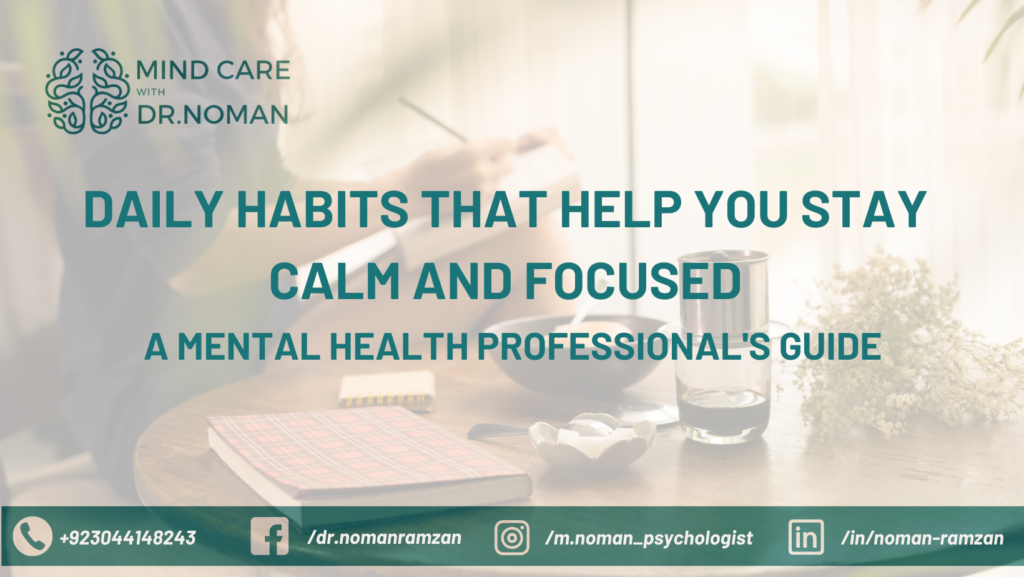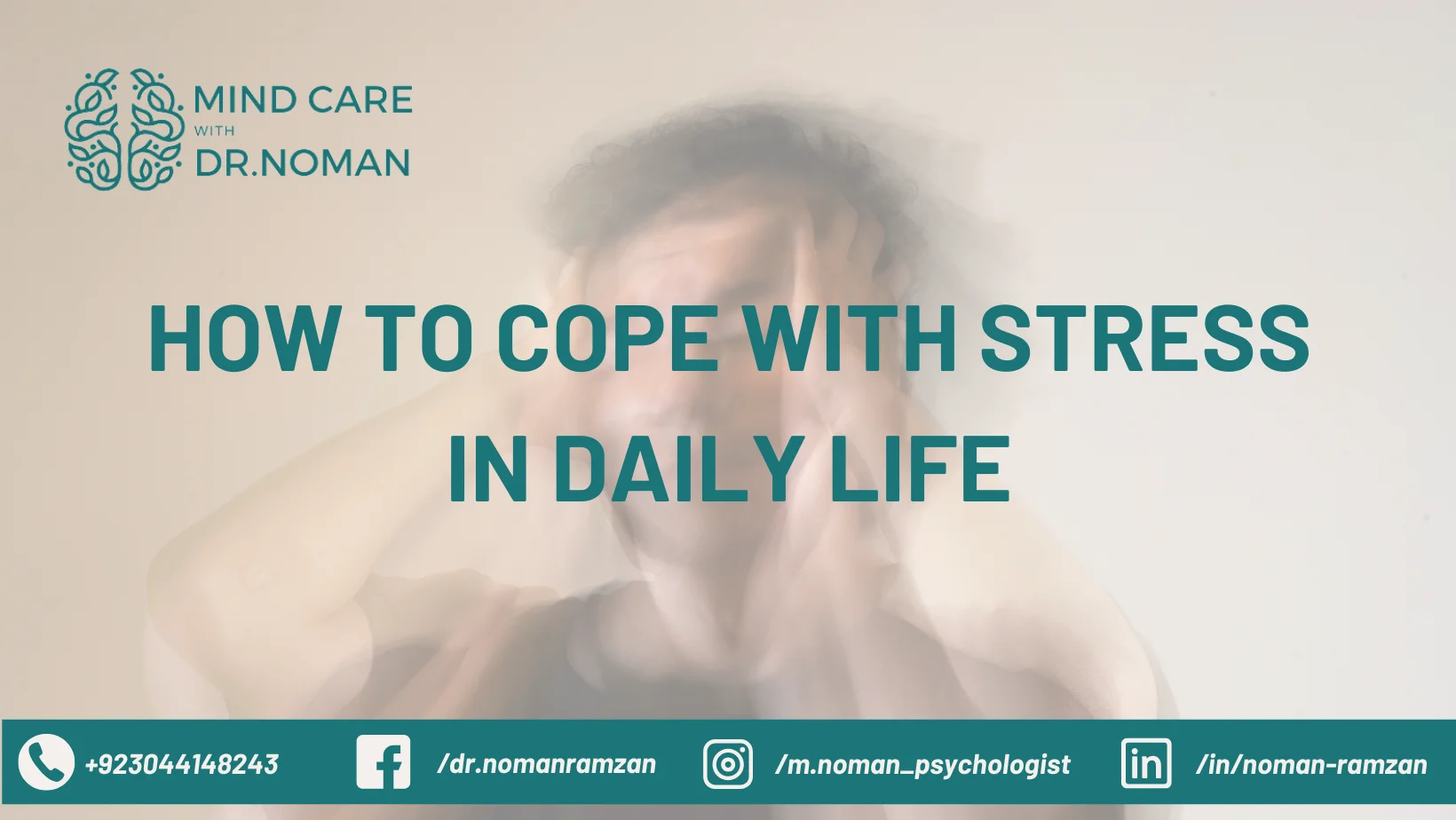In today’s fast-paced world, stress has become an unwelcome companion in many people’s lives. Whether it’s work pressure, family responsibilities, financial concerns, or health issues, stress can significantly impact our mental well-being and overall quality of life. As mental health professionals, we regularly see how chronic stress affects our clients—leading to anxiety, depression, sleep disturbances, and even physical health problems.
The good news is that you don’t need expensive treatments or dramatic lifestyle changes to manage stress effectively. Simple, consistent daily habits can make a remarkable difference in how you experience and respond to stress. In this comprehensive guide, we’ll explore evidence-based stress relief daily habits that can help you stay calm, focused, and resilient in the face of life’s challenges.

Understanding Stress: A Brief Overview
Before diving into specific stress relief daily habits, it’s important to understand what happens in your body when you experience stress. When faced with a perceived threat or challenge, your body activates the “fight-or-flight” response—releasing hormones like cortisol and adrenaline that prepare you to respond to danger.
This response was crucial for our ancestors’ survival, but in modern life, our stress response can become chronically activated by non-life-threatening stressors like traffic jams, work deadlines, or social media notifications. When stress becomes chronic, it can lead to:
- Persistent anxiety and worry
- Difficulty concentrating
- Sleep problems
- Digestive issues
- Weakened immune system
- Increased risk of heart disease and other health conditions
Establishing daily habits that counteract this stress response is essential for maintaining both mental and physical health. Let’s explore these evidence-backed stress relief daily habits that you can integrate into your routine.
1. Morning Mindfulness Practice
How it helps: Starting your day with mindfulness sets a calm tone and creates a buffer against stress.
Practical Implementation:
- Morning meditation: Begin with just 5 minutes of focused breathing or guided meditation. Apps like Headspace, Calm, or Insight Timer offer excellent beginner-friendly options.
- Mindful breakfast: Eat without distractions, focusing on the flavors, textures, and nourishment of your food.
- Intention setting: Take a moment to set a positive intention for your day, focusing on how you want to feel rather than just what you want to accomplish.
Research published in the Journal of Psychosomatic Research has shown that regular mindfulness practice can reduce cortisol levels (the primary stress hormone) and improve emotional regulation. Even brief daily practice can yield significant benefits over time.
2. Strategic Physical Activity
How it helps: Exercise is one of the most powerful stress-busters available, releasing endorphins (natural mood elevators) and reducing stress hormones.
Practical Implementation:
- Morning movement: Even 10 minutes of stretching, yoga, or a brisk walk can energize your body and clear your mind.
- Micro-workouts: Incorporate short bursts of activity throughout your day—take the stairs, do 5 minutes of stretching between meetings, or try desk exercises.
- Evening unwinding: Gentle movement like walking or yoga in the evening can help transition from work mode to relaxation.
The American Psychological Association consistently identifies exercise as a key strategy for stress management. The type of exercise matters less than consistency—find activities you enjoy and can realistically maintain.
3. Breathing Techniques for Instant Calm
How it helps: Controlled breathing directly counteracts the physiological stress response, activating the parasympathetic nervous system (rest and digest mode).
Practical Implementation:
- Box breathing: Inhale for 4 counts, hold for 4, exhale for 4, hold for 4. Repeat for 5 cycles when feeling stressed.
- 4-7-8 breathing: Inhale for 4 counts, hold for 7, exhale for 8. This pattern is particularly effective for anxiety.
- Breathing breaks: Schedule 2-3 minute breathing sessions throughout your day, especially before challenging tasks or meetings.
Research from Harvard Medical School confirms that regular practice of these techniques can lower blood pressure, reduce anxiety, and improve focus—making them powerful stress relief daily habits.
4. Nutritional Approaches to Stress Management
How it helps: What you eat directly affects your body’s stress response and overall resilience.
Practical Implementation:
- Regular, balanced meals: Maintain stable blood sugar by eating at consistent times and including protein, healthy fats, and complex carbohydrates.
- Hydration: Dehydration can amplify stress reactions. Aim for 8-10 glasses of water daily.
- Limiting stress-inducing substances: Reduce caffeine, alcohol, and sugar, which can trigger or worsen stress responses.
- Incorporating stress-reducing foods: Include foods rich in magnesium (dark chocolate, avocados, nuts), omega-3 fatty acids (fatty fish, flaxseed), and antioxidants (berries, leafy greens).
Studies published in the Journal of Nutrition have demonstrated connections between dietary patterns and stress levels. A Mediterranean-style diet, in particular, has been linked to lower perceived stress and improved mood regulation.
5. Digital Boundaries and Technology Management
How it helps: Constant connectivity is a modern stressor that requires intentional management.
Practical Implementation:
- Morning buffer: Avoid checking email or social media for the first 30-60 minutes after waking.
- Notification management: Customize notifications to minimize interruptions from non-urgent messages.
- Digital sunset: Establish a cutoff time (ideally 1-2 hours before bed) for screens to improve sleep quality.
- Tech-free zones: Designate specific areas in your home (like the dining table or bedroom) as device-free spaces.
The American Psychiatric Association recognizes technology management as increasingly important for mental health. Establishing healthy digital boundaries is now considered an essential stress relief daily habit.
6. Connection and Social Support
How it helps: Positive social connections buffer against stress and provide emotional resources for resilience.
Practical Implementation:
- Daily check-ins: Brief, meaningful exchanges with loved ones can provide significant emotional support.
- Active listening: Practice being fully present in conversations, rather than multitasking or planning your response.
- Scheduled social time: Make regular appointments for connection just as you would for work meetings.
- Boundaries: Learn to say no to social obligations that deplete rather than nourish you.
Research from the National Institute of Mental Health confirms that strong social support networks correlate with lower stress levels and greater emotional resilience. Quality matters more than quantity—focus on nurturing meaningful connections.
7. Sleep Hygiene and Relaxation Rituals
How it helps: Quality sleep is foundational to stress resilience, while poor sleep amplifies stress reactions.
Practical Implementation:
- Consistent schedule: Go to bed and wake up at similar times each day, even on weekends.
- Sleep-promoting environment: Keep your bedroom dark, cool, and free from electronic distractions.
- Evening wind-down ritual: Develop a 30-minute pre-sleep routine that signals to your body it’s time to relax (warm bath, light stretching, reading).
- Sleep-friendly habits: Avoid heavy meals, alcohol, and strenuous exercise close to bedtime.
The Sleep Foundation reports that individuals who practice good sleep hygiene demonstrate greater emotional regulation and stress resilience. Making sleep a priority is one of the most impactful stress relief daily habits.
8. Gratitude and Positive Psychology Practices
How it helps: Intentionally focusing on positive aspects of life counterbalances the brain’s natural negativity bias.
Practical Implementation:
- Daily gratitude journal: Write down 3-5 things you’re grateful for each day.
- Savoring practice: Take time to fully experience and appreciate positive moments, no matter how small.
- Acts of kindness: Small gestures of generosity boost mood and perspective.
- Strengths focus: Regularly engage in activities that utilize your natural strengths and talents.
Research published in the Journal of Personality and Social Psychology demonstrates that regular gratitude practices significantly reduce stress hormones and improve overall well-being when maintained as consistent stress relief daily habits.
9. Nature Connection
How it helps: Time in natural environments has been shown to reduce stress hormones and improve mood.
Practical Implementation:
- Morning sunlight: Exposure to natural light early in the day helps regulate circadian rhythms and stress hormones.
- Green micro-breaks: Even brief views of nature (looking out a window at trees) can provide mental restoration.
- Walking meetings: Conduct calls or brainstorming sessions while walking outdoors when possible.
- Indoor nature: Houseplants, nature sounds, or nature photography can provide some benefits when outdoor access is limited.
Studies from the University of Michigan and other institutions have documented the stress-reducing effects of nature exposure, finding that even 20 minutes in a natural setting significantly lowers cortisol levels.
Conclusion: Building Your Personal Stress Management Routine
The key to effective stress management lies not in occasional interventions but in consistent daily habits that work together to build resilience. Rather than trying to implement all these stress relief daily habits at once, choose 2-3 that resonate most with you and focus on integrating them into your routine.
Remember that stress management is highly individual—what works for someone else might not work for you. Pay attention to how different practices affect your stress levels and adjust accordingly. The goal isn’t perfection but progress toward greater calm, focus, and emotional balance.
At our mental health clinic, we help clients develop personalized stress management plans that fit their unique needs and lifestyles. If you’re struggling with stress that feels overwhelming or unmanageable, don’t hesitate to reach out to a mental health professional. Sometimes, having guidance and support can make all the difference in developing effective stress relief daily habits.
By taking small, consistent steps toward better stress management, you’re investing not just in immediate relief but in long-term mental and physical health. Start today with just one habit, and build from there—your future self will thank you.


